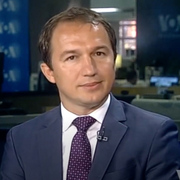

![]() Mini Profile
Mini Profile
Akan Ismaili
Former Kosovo ambassador to the U.S.
| 1 Personal | Not listed | 3,871,746 CHF |
Kosovo’s former ambassador to the U.S. had millions of Swiss francs stashed in a secret Credit Suisse account, which he did not declare as required by law, according to leaked bank records.
Former telecommunications mogul Akan Ismaili was appointed ambassador in 2012, four years after Kosovo declared its independence from Serbia following a brutal war in the 1990s, and a transition period overseen by the United Nations.
As an ambassador until 2015, Ismaili was legally required to declare his assets to Kosovo’s Agency for Prevention of Corruption. He reported holdings including properties, cash savings and companies, but Ismaili failed to notify authorities of his Credit Suisse account, which sat at almost 3.9 million Swiss francs in June 2014.
🔗The Suisse Secrets Investigation
Suisse Secrets is a collaborative journalism project based on leaked bank account data from Swiss banking giant Credit Suisse.
The data was provided by an anonymous source to the German newspaper Süddeutsche Zeitung, which shared it with OCCRP and 46 other media partners around the world. Reporters on five continents combed through thousands of bank records, interviewed insiders, regulators, and criminal prosecutors, and dug into court records and financial disclosures to corroborate their findings. The data covers over 18,000 accounts that were open from the 1940s until well into the last decade. Together, they held funds worth more than $100 billion.
"I believe that Swiss banking secrecy laws are immoral,” the source of the data said in a statement. “The pretext of protecting financial privacy is merely a fig leaf covering the shameful role of Swiss banks as collaborators of tax evaders. This situation enables corruption and starves developing countries of much-needed tax revenue.”
Because the Credit Suisse data obtained by journalists is incomplete, there are a number of important caveats to be kept in mind when interpreting it. Read more about the project, where the data came from, and what it means.
The Agency for Prevention of Corruption told Preportr and OCCRP it would likely be difficult to investigate Ismaili’s holdings in Switzerland.
“We would look at the possibilities for verification and investigation, although verifying the status of bank accounts held abroad is difficult and often results in failure due to the legislation of the countries where bank accounts are held,” the Commission said in an email.
Ismaili did not respond to emailed requests for comment.
Under Kosovo law, senior public officials who hide their assets or make false declarations can be fined and imprisoned for up to five years.
Ismaili jumped into the tech sector right after the 1999 NATO bombing of Serbia and Kosovo, which ended the war, co-founding the non-profit Internet Project Kosovo (IPKO). He then moved into the private sector with IPKO Telecommunications, which became the second-largest provider of internet, mobile phone, and cable television services in Kosovo.
Preportr reported in 2015 on the struggles of Kosovo authorities to track down assets held by public officials abroad. The head of the Agency for Prevention of Corruption at the time told reporters that “there has been a problem in implementation” with countries like Albania and Montenegro, which have signed agreements to help with asset tracking.